The Michael E. Marmura Lecture Series in Arabic Studies is an interdisciplinary and multi-perspectival endeavor by faculty members of the Department of Near & Middle Eastern Civilizations at the University of Toronto. The series is devoted to explorations of culture, history and politics in the Arab world, its diasporas, and their transnational itineraries. We use “Arabic” studies rather than “Arab” studies to gesture towards a field based on a common language context rather than on an ethnicity.
It is dedicated to the memory of our late colleague, Michael E. Marmura, F.R.S.C. Professor of Medieval Islamic Philosophy, who was born 1929 in Jerusalem, Palestine, and died 2009 in Antigonish, Nova Scotia. The lecture series seeks to promote public education, scholarly collaboration, and intellectual engagement among students and scholars in the Greater Toronto Area.
For further information or to add yourself to the mailing list, please contact Jeannie Miller or Nada Moumtaz
A Laudatio of Professor Michael E. Marmura, F.R.S.C
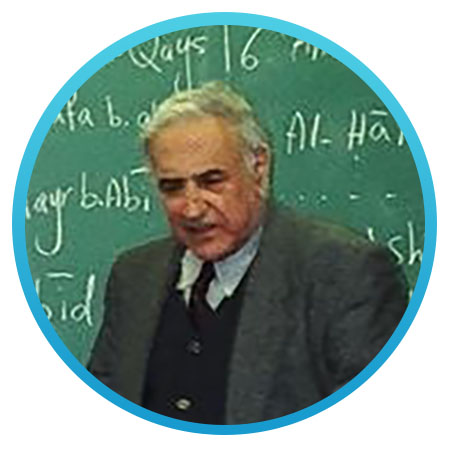
By Jens Hanssen
On the occasion of the Launching of the Michael E. Marmura Lecture Series in Arabic Studies
at the Department of Near & Middle Eastern Civilizations
University of Toronto, January 14th, 2021
2024–2025 Lectures
* All lectures 3 - 5 PM, Bancroft Building BF200B
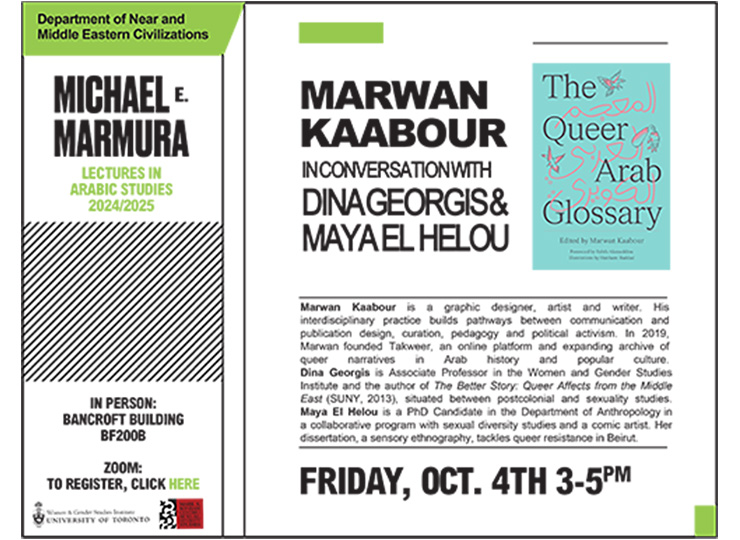
Marwan Kaabour
Graphic designer, artist and writer
In conversation with Dina Georgis and Maya El Helou
“The Queer Arab Glossary”
When conventional language does not equip us with the tools to speak about ourselves, we create our own. Slang expresses words and feelings that break down boundaries. It is a form of protest and fills in the gaps.
The Queer Arab Glossary is the first published collection of Arabic LGBTQ+ slang. This bold guide captures the lexicon of the queer Arab community in all its differences, quirks and felicities. Featuring fascinating facts and anecdotes, it contains more than 300 terms in both English and Arabic, ranging from the humorous to the harrowing, serious to tongue-in-cheek, pejorative to endearing. Here, leading queer Arab artists, academics, activists and writers offer insightful essays situating this groundbreaking glossary in a modern social and political context.
With beautiful, witty illustrations, The Queer Arab Glossary is a powerful response to pervasive myths and stereotypes around sexuality and an invitation to take a journey into queerness throughout the Arab world.
Marwan Kaabour is a graphic designer, artist and writer. His interdisciplinary practice builds pathways between communication and publication design, curation, pedagogy and political activism. Alongside his independent projects, he works with non-profit institutions, companies and individuals in arts and culture sectors. In 2019, Marwan founded Takweer, an online platform and expanding archive of queer narratives in Arab history and popular culture. His debut book, The Queer Arab Glossary, was published in June 2024.
Marwan moved from his hometown Beirut to London in 2011 to pursue a master's degree in Graphic Design, before joining renowned design agency Barnbrook. He laeter founded his own studio in 2020.
Dina Georgis is Associate Professor in the Women and Gender Studies Institute and the author of The Better Story: Queer Affects from the Middle East (SUNY, 2013). Her work is situated between postcolonial and sexuality studies.
Maya El Helou is a PhD Candidate in the Department of Anthropology in a collaborative program with Sexual Diversity Studies and a comic artist. Her dissertation, a sensory ethnography, tackles queer resistance in Beirut.
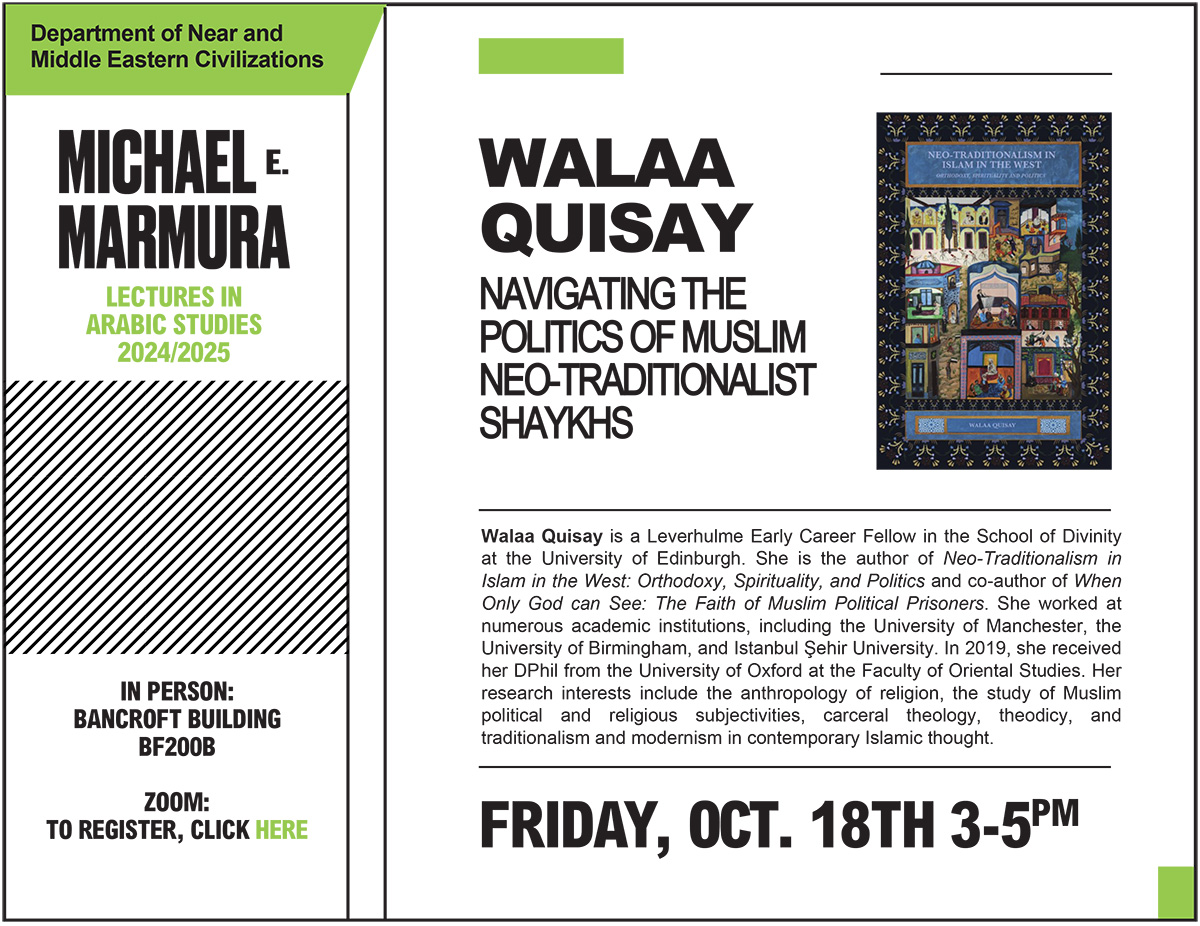
Walaa Quisay
Leverhulme Early Career Fellow in the School of Divinity at the University of Edinburgh
Navigating the Politics of Muslim Neo-Traditionalist Shaykhs
Exploring tensions between traditional orientations and modern subjectivities, the pursuit of enchantment, and existing in a disenchanted, secular world, Neo-traditionalism in Islam in the West examines neo-traditionalism, its public pedagogues and their students—seekers of sacred knowledge—in the Euro-American context. These pedagogues, many of whom are white converts to Islam such as Hamza Yusuf, Abdal Hakim Murad, and Umar Faruq Abd-Allah, guide their followers through a paradigmatic critique of modernity. They focus on affirming spirituality, self-purification, and religious orthodoxy and advocate for a traditional metaphysical worldview along with recognition of and deference to spiritual (and political) authorities. This study examines the convergence of Muslim neo-traditionalists with the religious right and culture-war polemicists – on the one hand – and the role they have played alongside policymakers nationally and transnationally. On the national front, they argue for an alliance of conservative believers that provides the same paradigm shared by the so-called ‘moral majority’ and with which Muslims can unapologetically voice their concerns on the dissipation of family values and sexual politics. Globally, they have contributed to forging a vision for a ‘moderate Islam’ after the War on Terror and promoted a counterrevolutionary and statist stance after the Arab Spring.
Walaa Quisay is a Leverhulme Early Career Fellow in the School of Divinity at the University of Edinburgh. She is the author of Neo-Traditionalism in Islam in the West: Orthodoxy, Spirituality, and Politics and co-author of When Only God can See: The Faith of Muslim Political Prisoners. She worked at numerous academic institutions, including the University of Manchester, the University of Birmingham, and Istanbul Şehir University. In 2019, she received her DPhil from the University of Oxford at the Faculty of Oriental Studies. Her research interests include the anthropology of religion, the study of Muslim political and religious subjectivities, carceral theology, theodicy, and traditionalism and modernism in contemporary Islamic thought.
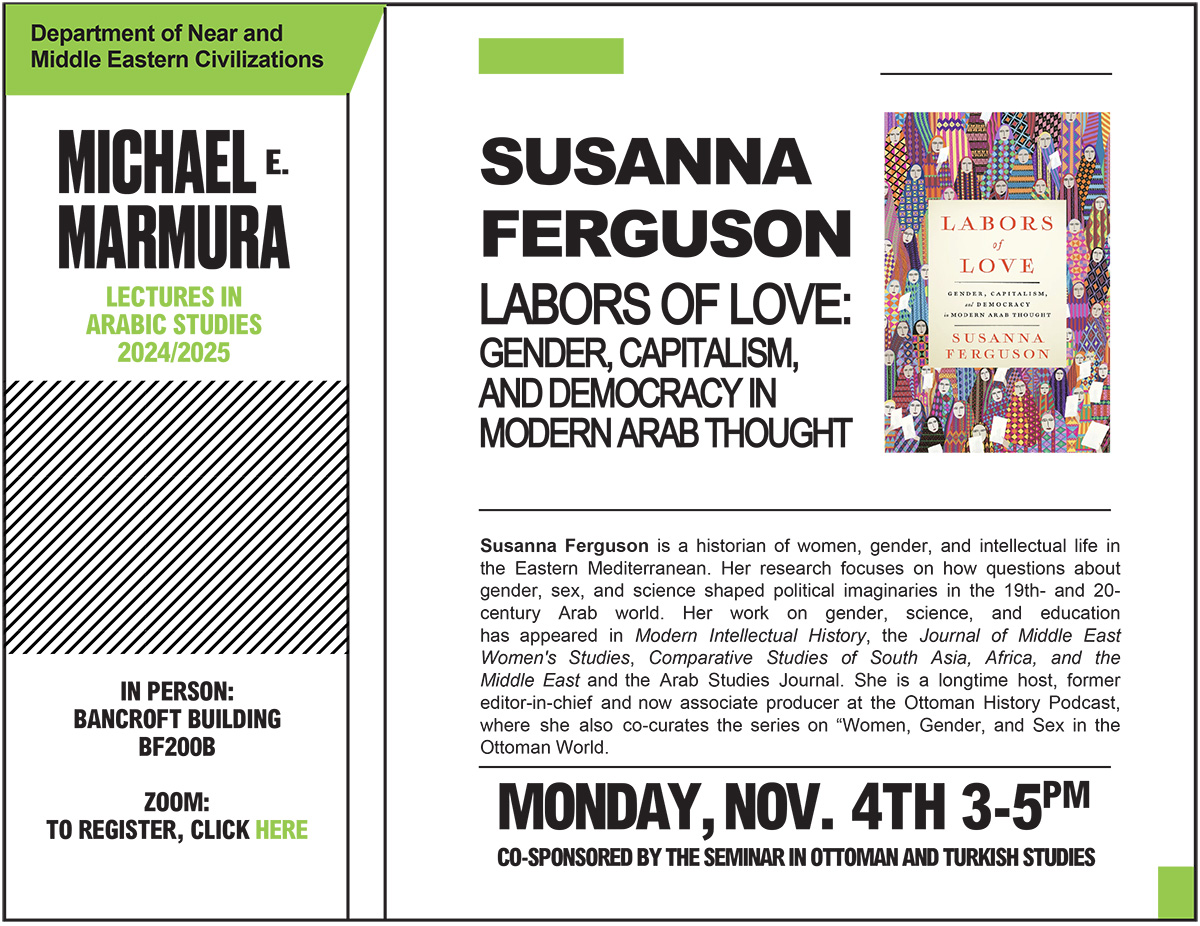
Susanna Ferguson
Labors of Love: Gender, Capitalism, and Democracy in Modern Arab Thought
How to raise a child became a central concern of intellectual debate from Cairo to Beirut over the course of the late nineteenth and early twentieth centuries. Intimately linked with discussions around capitalism and democracy, considerations about women, gender, and childrearing emerged as essential to modern social theory. Arab writers, particularly women, made sex, the body, and women's ethical labor central to fending off European imperial advances, instituting representative politics, and managing social order. Labors of Love traces the political power of motherhood and childrearing in Arabic thought. Susanna Ferguson reveals how debates around raising children became foundational to feminist, Islamist, and nationalist politics alike—opening up conversations about civilization, society, freedom, temporality, labor, and democracy. While these debates led to expansions in girls' education and women writers' authority, they also attached the fate of nations to women's unwaged labor in the home. Ferguson thus reveals why women and the family have been stumbling blocks for representative regimes around the world. She shows how Arab women's writing speaks to global questions—the devaluation of social reproduction under capitalism, the stubborn maleness of the liberal subject, and why the naturalization of embodied, binary gender difference has proven so difficult to overcome.
Susanna Ferguson is a historian of women, gender, and intellectual life in the Eastern Mediterranean. Her research focuses on how questions about gender, sex, and science shaped political imaginaries in the 19th- and 20-century Arab world. Her work on gender, science, and education has appeared in Modern Intellectual History, the Journal of Middle East Women's Studies, Comparative Studies of South Asia, Africa, and the Middle East and the Arab Studies Journal. She is a longtime host, former editor-in-chief and now associate producer at the Ottoman History Podcast, where she also co-curates the series on “Women, Gender, and Sex in the Ottoman World.
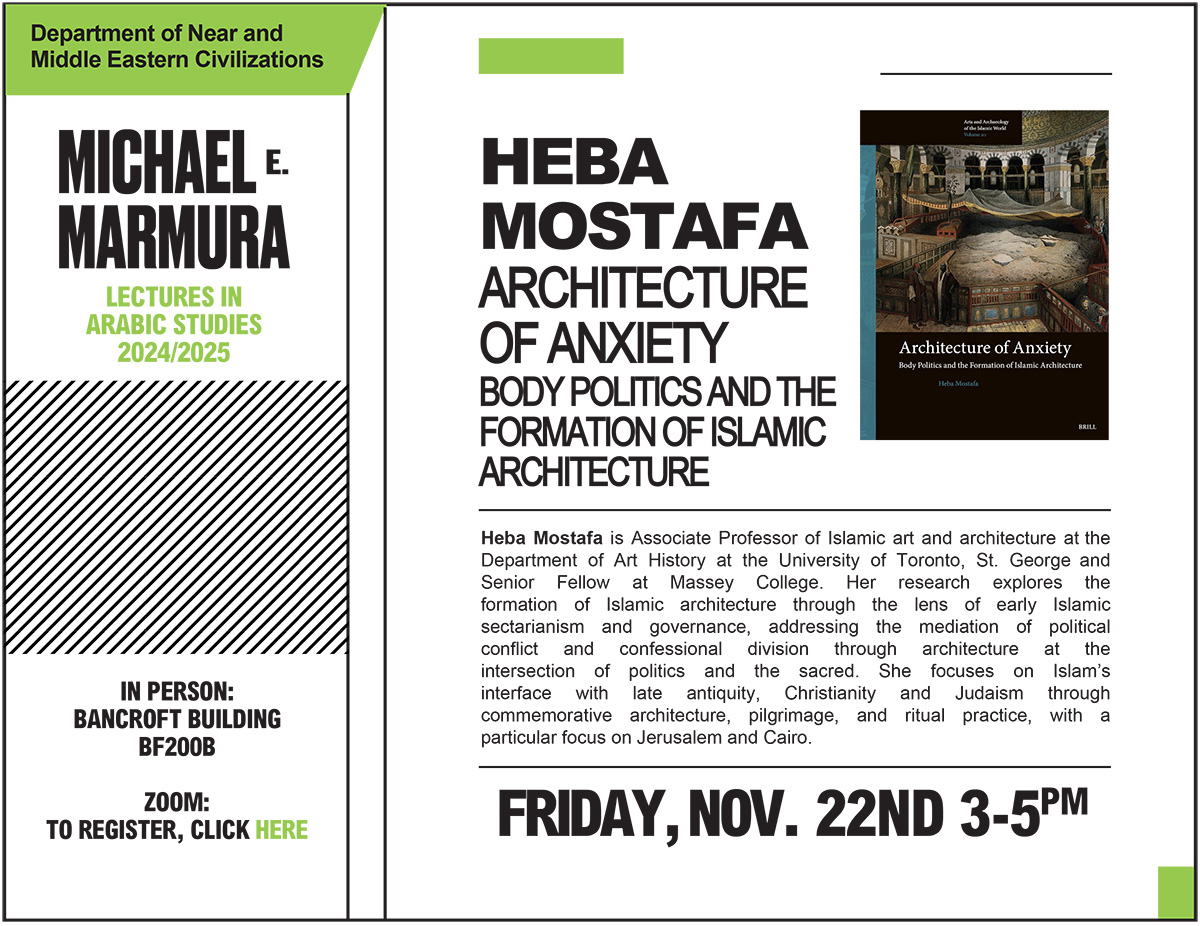
Heba Mostafa
Associate Professor, University of Toronto and Senior Fellow at Massey College
Architecture of Anxiety, Body Politics and the Formation of Islamic Architecture
Structured as five microhistories c. 632-705, this book offers a counternarrative for the formation of Islamic architecture and the Islamic state. It adopts a novel periodization informed by moments of historical violence and anxiety around caliphal identities in flux, animating histories of the minbar, throne, and maqsura as a principal nexus for navigating this anxiety. It expands outward to re-assess the mosque and palace with a focus on the Qubbat al-Khadraʾ and the Dar al-Imara in Kufa. It culminates in a reading of the Dome of the Rock in Jerusalem as a site where eschatological anxieties and political survival converge
Heba Mostafa is Associate Professor of Islamic art and architecture at the Department of Art History at the University of Toronto, St. George and Senior Fellow at Massey College. She received her doctorate from Cambridge University’s Department of Architecture in 2012 and holds degrees in architecture and the history of Islamic architecture from Cairo University and the American University in Cairo. Her research explores the formation of Islamic architecture through the lens of early Islamic sectarianism and governance, addressing the mediation of political conflict and confessional division through architecture at the intersection of politics and the sacred. She focuses on Islam’s interface with late antiquity, Christianity and Judaism through commemorative architecture, pilgrimage, and ritual practice, with a particular focus on Jerusalem and Cairo. Her current project explores nature veneration practices in Medieval Cairo, with a focus on the Nilometer at al-Rawda Island, bringing into conversation the mediatory role of nature in reconciling the religious, spiritual, and scientific contexts in Medieval Islam.
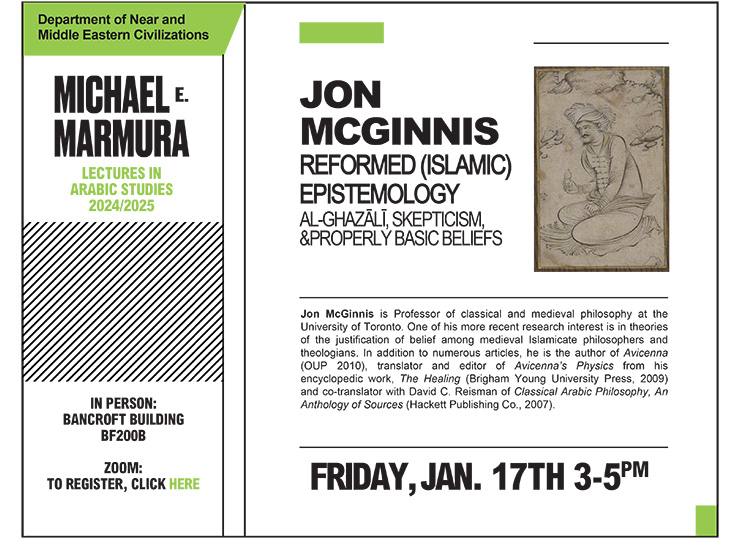
Jon McGinnis
Professor of classical and medieval philosophy at the University of Toronto
Reformed (Islamic) Epistemology: al-Ghazālī, Skepticism, and Properly Basic Beliefs
The 'Evidentialist Objection' maintains that there simply is not sufficient evidence to justify belief in God. Of course, the objection can be extended to a whole host of religious beliefs. The problem is not new, and in its extended form, namely, justifying religious beliefs more generally, it was as much at issue in the medieval Islamic world as it is among contemporary philosophers of religion today. The presentation considers this medieval Islamic manifestation of the Evidentialist Objection, its context, and Abū Ḥāmid al-Ghazālī’s response. That response, however, can only be appreciated by considering Ghazālī's travel from skepticism to certainty and a rethinking of what count as ‘properly basic’ beliefs, a position that resonates well with the recent reformed epistemology of certain contemporary philosophers of religion.
Jon McGinnis is Professor of classical and medieval philosophy at the University of Toronto. One of his more recent research interest is in theories of the justification of belief among medieval Islamicate philosophers and theologians. In addition to numerous articles, he is the author of Avicenna (OUP 2010), translator and editor of Avicenna’s Physics from his encyclopedic work, The Healing (Brigham Young University Press, 2009) and co-translator with David C. Reisman of Classical Arabic Philosophy, An Anthology of Sources (Hackett Publishing Co., 2007).
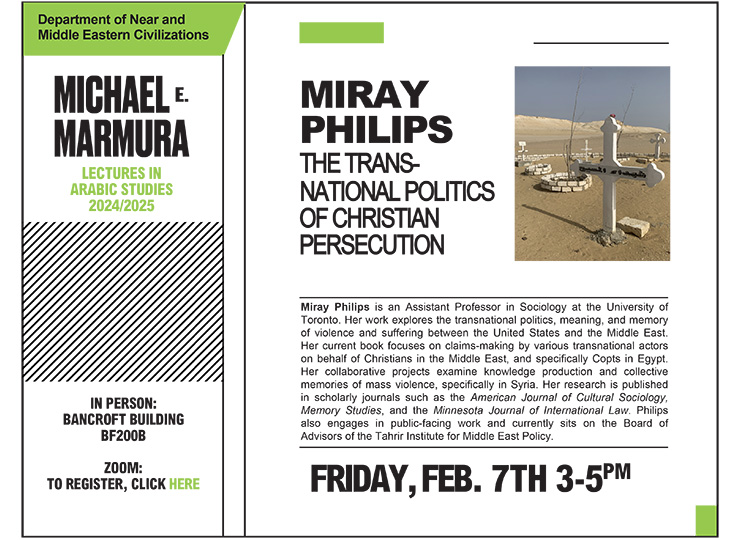
Miray Philips
Assistant Professor in Sociology at the University of Toronto
The Transnational Politics of Christian Persecution
A perception that Christianity is under attack has animated contemporary American political culture, driving domestic policies that advance Christian political power and foreign policies to protect Christians globally. In this talk, I specifically map how conservative American Christians appropriate the suffering of Christians in the Middle East to claim that Christians everywhere, including in the United States, are persecuted. Drawing on the literature of global memory cultures, I argue that the localization of Christian persecution is facilitated by conservative American Christians who act as members of transnational memory networks, transmitting images and memories of Christian persecution from the Middle East to the United States. In doing so, they transform nation-specific experiences of suffering to a universal injury of Christian persecution, expanding the category of victim to include all Christians everywhere.
Miray Philips is an Assistant Professor in Sociology at the University of Toronto. Her work focuses on the transnational politics, meaning, and memory of violence and suffering between the United States and the Middle East. Her current book project explores conflictual representations of religious difference in the context of the global war on terror. Empirically, it examines claims-making by various transnational actors on behalf of Christians in the Middle East, and specifically Copts in Egypt. Her collaborative projects investigate knowledge production and collective memories of mass violence, specifically in Syria. Her research is published in scholarly journals such as the American Journal of Cultural Sociology, Memory Studies, and the Minnesota Journal of International Law. Miray Philips also engages in public-facing work and currently sits on the Board of Advisors of the Tahrir Institute for Middle East Policy.
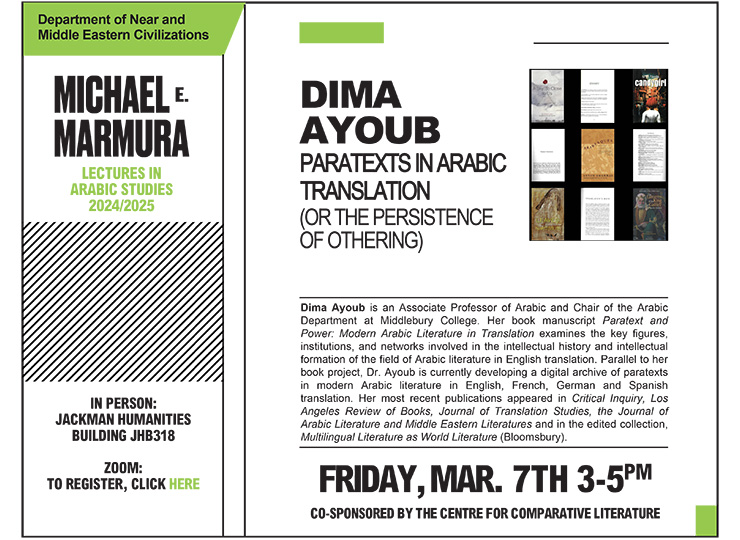
Dima Ayoub
Associate Professor, Middlebury College
Paratexts in Arabic Translation (or the Persistence of Othering)
In this talks, Ayoub examines the key figures, institutions, and networks involved in the intellectual history and intellectual formation of the field of Arabic literature in English translation. She foregrounds a dense array of translators, publishers, and writers to explore the evolution of post-war Arabic-to-English literary translation and the interplay between some of Arabic literature’s foremost English translators and government, academic, and publishing institutions. She asks: How do translators rely on paratexts (introductions, forewords, afterwords, prefaces) to navigate the Orientalist legacies and political agendas that shape Arabic literature’s westward movement into the Anglophone world?
Dima Ayoub is Associate Professor of Arabic and Chair of the Arabic Department at Middlebury College where she was also the C.V. Starr Junior Faculty Fellow in International Studies and former director of the Middle East studies program. Her book manuscript Paratext and Power: Modern Arabic Literature in Translation examines the key figures, institutions, and networks involved in the intellectual history and intellectual formation of the field of Arabic literature in English translation. Parallel to her book project, Professor Ayoub is currently developing a digital archive of paratexts in modern Arabic literature in English, French, German and Spanish translation. Her most recent publications appeared in Critical Inquiry, Los Angeles Review of Books, Journal of Translation Studies, the Journal of Arabic Literature and Middle Eastern Literatures and in the edited collection, Multilingual Literature as World Literature (Bloomsbury).
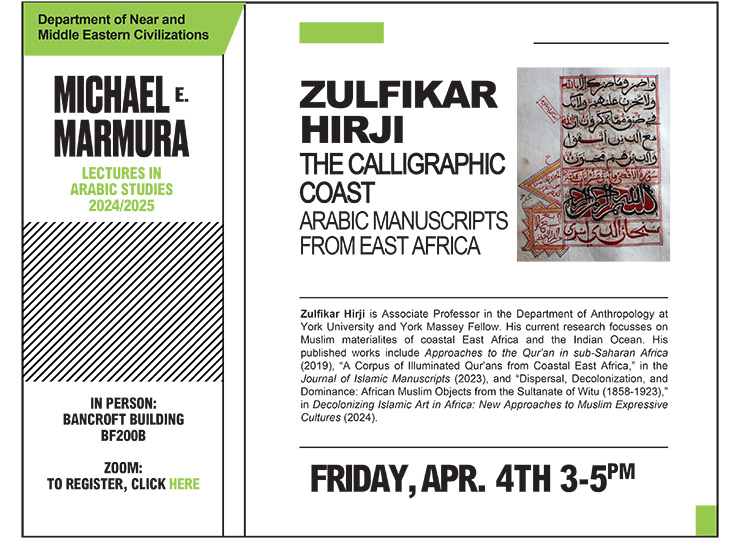
Zulfikar Hirji
The Calligraphic Coast: Arabic Manuscripts from East Africa
Zulfiqar Hirji is an Associate Professor in the Department of Anthropology at York University and York Massey Fellow. His current research focusses on Muslim materialities of coastal East Africa and the Indian Ocean. His published works include Approaches to the Qur’an in sub-Saharan Africa (2019), “A Corpus of Illuminated Qur’ans from Coastal East Africa,” in the Journal of Islamic Manuscripts (2023), and “Dispersal, Decolonization, and Dominance: African Muslim Objects from the Sultanate of Witu (1858-1923),” in Decolonizing Islamic Art in Africa: New Approaches to Muslim Expressive Cultures (2024).
Abstract: This talk discusses an extraordinary corpus of illuminated Qur’ans from East Africa’s Lamu archipelago. Produced between the 18th and 19th centuries, these little-known manuscripts represent a high point in coastal East Africa’s histories of Swahili Muslim manuscript production and Arabic writing. They have distinctive visual features, and add an important component to the history of Islamic manuscript production in Africa.
2023–2024 Lectures
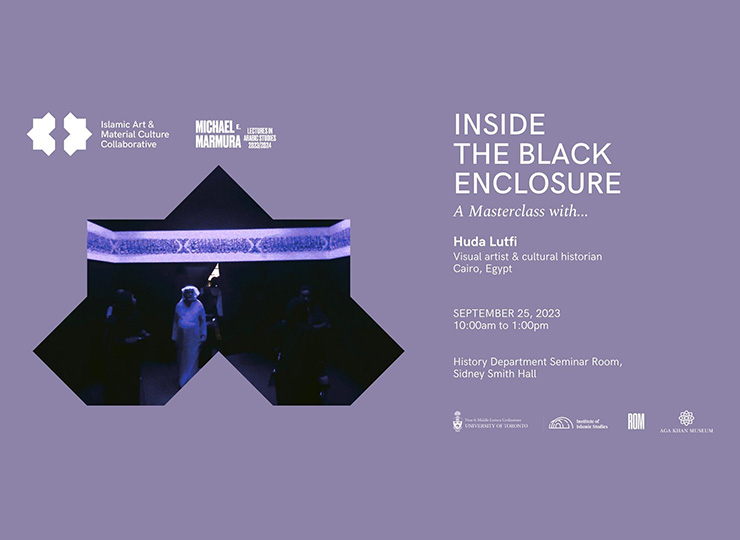
Huda Lutfi
Visual Artist and Cultural Historian, Cairo, Egypt
Inside the Black Enclosure: A Masterclass for Graduate Students
In this graduate masterclass, contemporary Egyptian artist Huda Lutfi will share her experiences of creating her recent installation Inside the Black Enclosure for the inaugural Islamic Arts Biennale which was held from January 23–May 23, 2023 in Jeddah, Saudi Arabia.
Lutfi will speak about the history of pilgrimage at Mecca, the importance of the kiswa covering of the ka’ba, the craftspeople involved in its making over history, and how it all connects to her recent installation. She will also discuss her artistic practice and career and problematize the notion of an Islamic Arts Biennale as part of her talk, which will also include videos of her work.
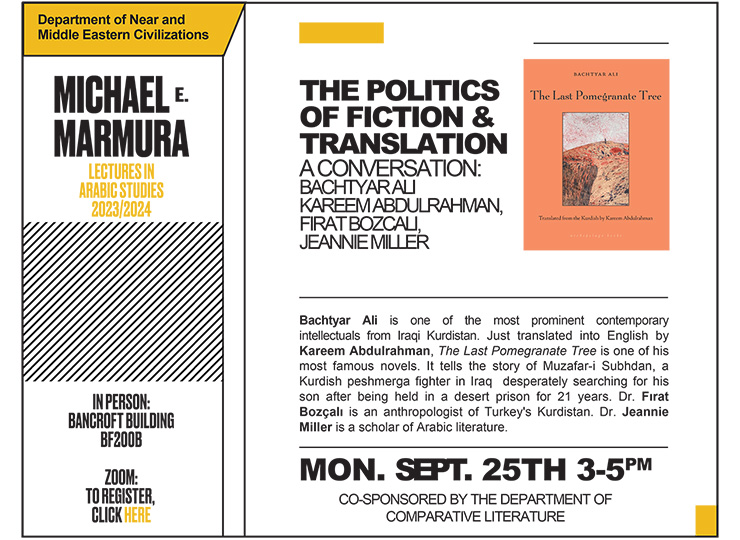
Bachtyar Ali, Kareem Abdulrahman, Firat Bozçalı & Jeannie Miller
The Politics of Fiction and Transation: A Conversation with Bachtyar Ali, Kareem Abdulrahman, Firat Bozçalı, and Jeannie Miller
Politics has at least two faces in Ali’s works. While his characters are in a constant search to prove their humanity, politics often appears as a barrier in that search. Why does their salvation seem to fall beyond politics? Yet another face is the politics of literature: Kurdish language has lived on the margins of the more dominant languages in the Middle East for centuries. In this context, lliterary translation could be seen as an effort to put the Kurds, the largest minority group without their own nation state, on the cultural map of the world.
In this conversation, we will probe questions such as: Where do the politics of publishing and those of the Middle East collide? Is literary translation a means to put the Kurds, the largest minority group without their own nation state, on the world’s cultural map? What unique challenges do translators of Kurdish texts face?
Bachtyar Ali is one of the most prominent contemporary intellectuals from Iraqi Kurdistan. The Last Pomegranate Tree (Archipelago Books, 2023), one of his most famous novels, was just translated into English by translator and Kurdish affairs analyst Kareem Abdulrahman. It tells the story of Muzafar-i-Subhdan, a Kurdish Peshmerga fighter in Iraq desperately searching for his son after being held in a desert prison for 21 years.
Fırat Bozçalı is an Assistant Professor of Anthropology at the University of Toronto. His research concentrates on political and legal anthropology with a special focus on smuggling economies, human rights advocacy, and Kurdish politics in Turkey.
Jeannie Miller is an Associate Professor of medieval Arabic literature in the Department of Near and Middle Eastern Civilizations.
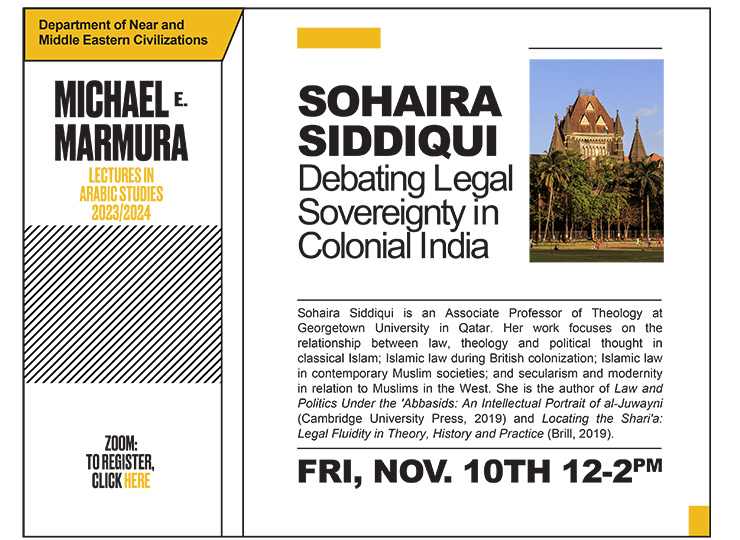
Sohaira Siddiqui
Associate Professor, Georgetown University, Qatar
Debating Legal Sovereignty in Colonial India
Sohaira Siddiqui is an Associate Professor of Theology at Georgetown University in Qatar. Her work focuses on the relationship between law, theology and political thought in classical Islam; Islamic law during British colonization; Islamic law in contemporary Muslim societies; and secularism and modernity in relation to Muslims in the West.
She is the author of Law and Politics Under the 'Abbasids: An Intellectual Portrait of al-Juwayni (Cambridge University Press, 2019) and Locating the Shari'a: Legal Fluidity in Theory, History and Practice (Brill, 2019). Her next book, Contesting Islamic Law in Colonial India, will be published in Fall 2024, followed by her second edited volume, The Cambridge Companion to Islamic Law, in Spring 2025.
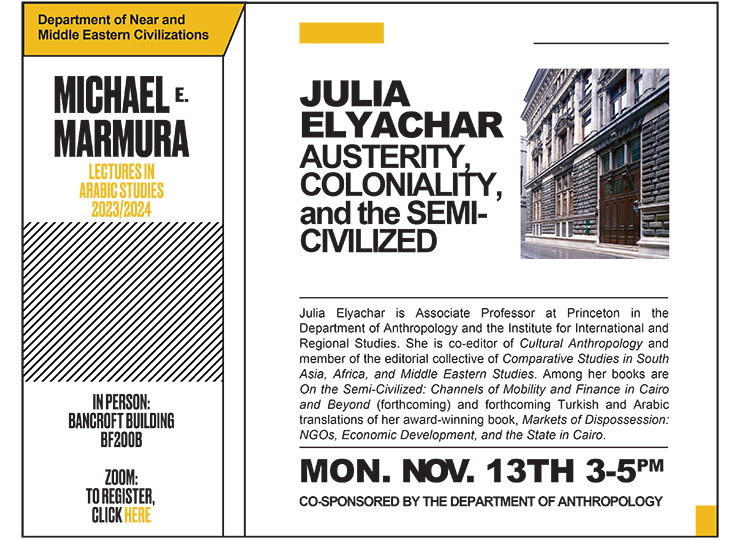
Julia Elyachar
Associate Professor, Princeton University
Austerity, Coloniality, and the Semi-Civilized
Julia Elyachar is Associate Professor at Princeton University in the Department of Anthropology and the Institute for International and Regional Studies. Co-editor of Cultural Anthropology and member of the editorial collective of Comparative Studies in South Asia, Africa, and Middle Eastern Studies, Elyachar was previously Associate Professor of Anthropology and Economics at UC Irvine, and director of the Center for Global Peace and Conflict Studies. Among her books are On the Semi-Civilized: Channels of Mobility and Finance in Cairo and Beyond (forthcoming); the co-edited Thinking Infrastructures (2019); and forthcoming Turkish and Arabic translations of her award-winning book, Markets of Dispossession: NGOs, Economic Development, and the State in Cairo (2005). She is the author of numerous articles published in, among others, Cultural Anthropology, American Anthropologist, American Ethnologist, The Journal of the Royal Anthropological Institute, and Comparative Studies in Society and History.
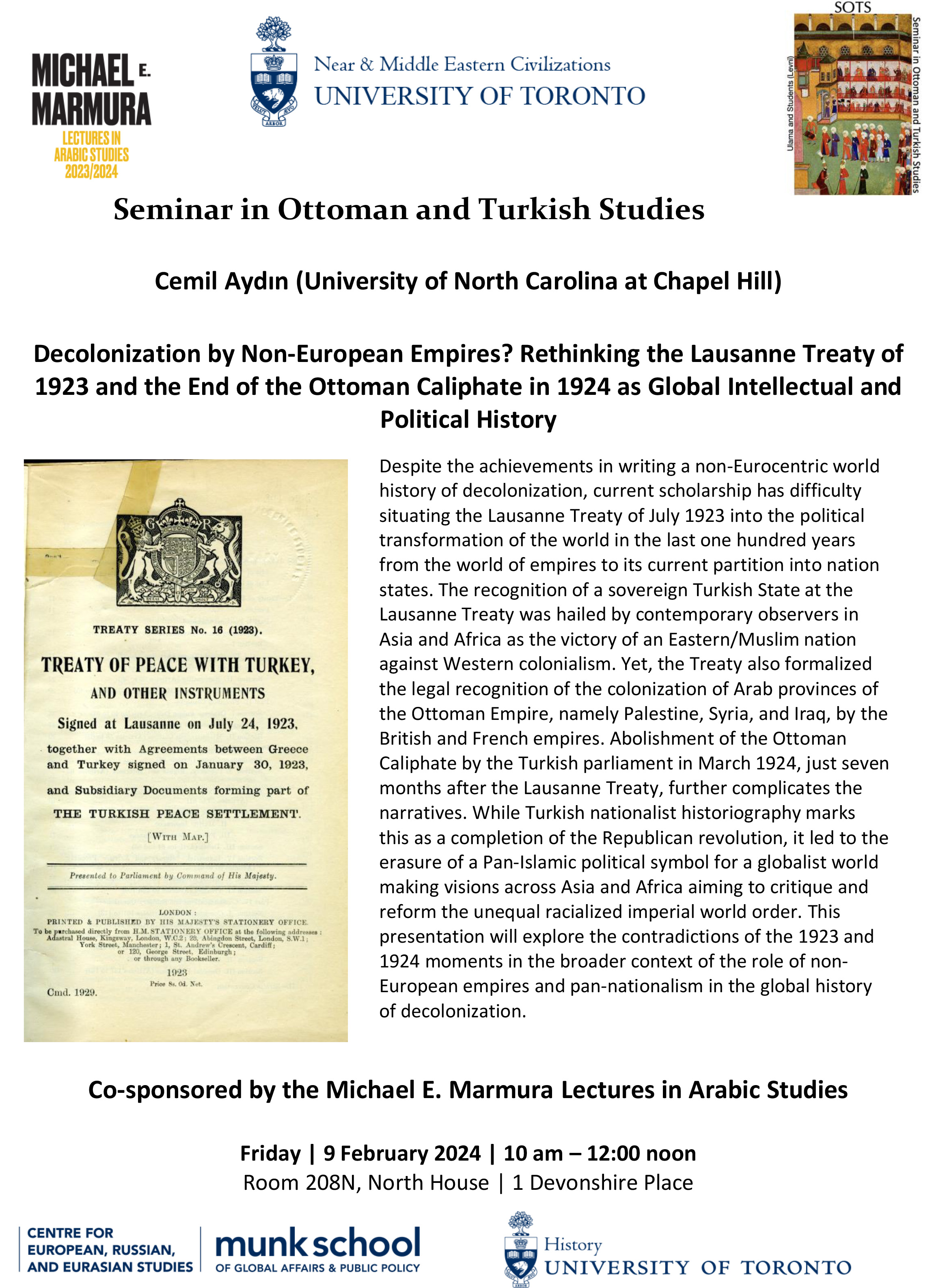
Cemil Aydın
University of North Carolina at Chapel Hill
Decolonization by Non-European Empires? Rethinking the Lausanne Treaty of 1923 and the End of the Ottoman Caliphate in 1924 as Global Intellectual and Political History
Despite the achievements in writing a non-Eurocentric world history of decolonization, current scholarship has difficulty situating the Lausanne Treaty of July 1923 into the political transformation of the world in the last one hundred years from the world of empires to its current partition into nation states. The recognition of a sovereign Turkish State at the Lausanne Treaty was hailed by contemporary observers in Asia and Africa as the victory of an Eastern/Muslim nation against Western colonialism. Yet, the Treaty also formalized the legal recognition of the colonization of Arab provinces of the Ottoman Empire, namely Palestine, Syria, and Iraq, by the British and French empires. Abolishment of the Ottoman Caliphate by the Turkish parliament in March 1924, just seven months after the Lausanne Treaty, further complicates the narratives. While Turkish nationalist historiography marks this as a completion of the Republican revolution, it led to the erasure of a Pan-Islamic political symbol for a globalist world making visions across Asia and Africa aiming to critique and reform the unequal racialized imperial world order. This presentation will explore the contradictions of the 1923 and 1924 moments in the broader context of the role of nonEuropean empires and pan-nationalism in the global history of decolonization. This event is Co-sponsored by the Seminar in Ottoman and Turkish Studies.
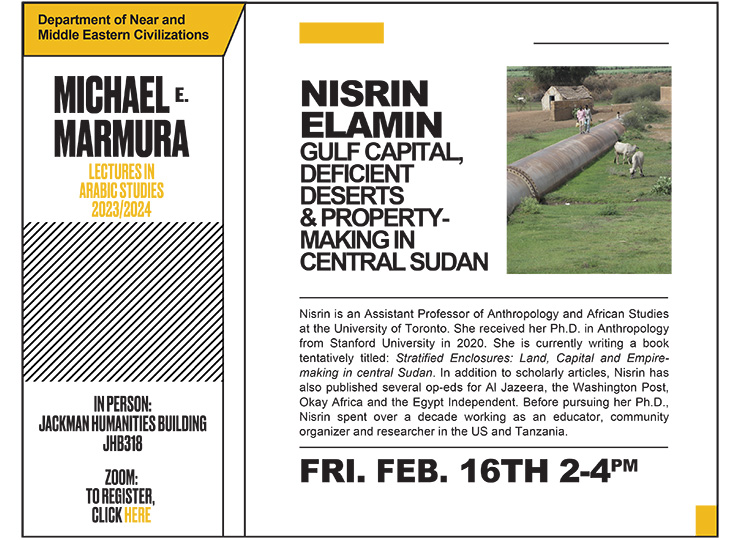
Nisrin Elamin
Assistant Professor of Anthropology and African Studies, University of Toronto
Gulf Capital, Deficient Deserts and Property-making in central Sudan
Nisrin Elamin is currently an Assistant Professor of Anthropology and African Studies at the University of Toronto. She received her Ph.D. in Anthropology from Stanford University in 2020. She is currently writing a book tentatively titled: Stratified Enclosures: Land, Capital and Empire-making in central Sudan which focuses on Saudi and Emirati land grabs and community resistance to land dispossession in the Gezira region of Sudan. In addition to scholarly articles, Nisrin has also published several op-eds for Al Jazeera, the Washington Post, Okay Africa and the Egypt Independent. Before pursuing her Ph.D., Nisrin spent over a decade working as an educator, community organizer and researcher in the US and Tanzania.
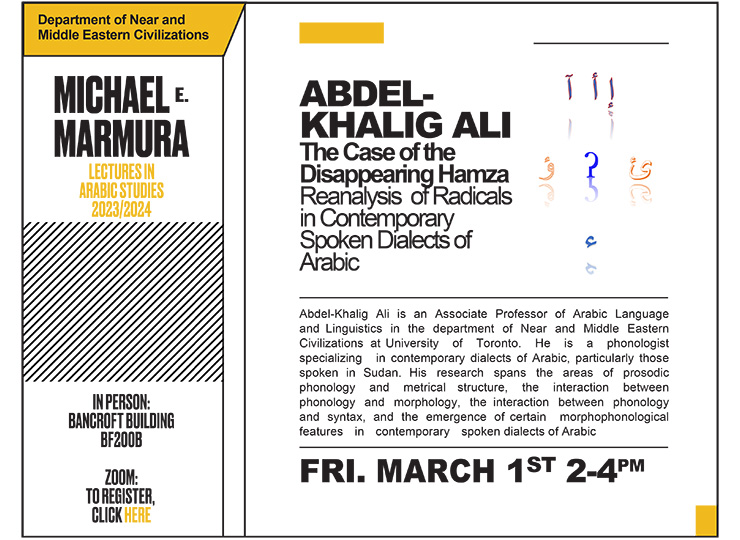
Abdel-Khalig Ali
Associate Professor, University of Toronto
The Case of the Disappearing Hamza: Radical Reanalysis in Contemporary Spoken Dialects of Arabic
The literature on the grammar of Classical Arabic describes intricate patterns of realization of the glottal stop, represented in the Arabic alphabet by the hamza diacritic. In his Al-Kita:b, the grammarian Sibawayh (d. between 793-796) dedicates an entire section to describing the patterns attested in the different dialects of Classical Arabic, spoken in the Arabian Peninsula. Many of these patterns are also attested in Modern Standard Arabic whose grammar bears significant resemblance to that of Classical Arabic. Most contemporary spoken dialects preserve the glottal stop in their phonemic inventories, and a cursory look at these dialects reveals equally interesting realization patterns. The small body of literature on this subject reports a general weakening and, in some contexts, a total loss of the glottal stop. However, systematic descriptive studies and explanations of these phenomena are simply lacking. In this talk, I address this limitation. I identify some of these patterns and offer an explanation as to why and how they have come to exist.
Abdel-Khalig Ali is an Associate Professor of Arabic Language and Linguistics in the department of Near and Middle Eastern Civilizations at University of Toronto. He is a phonologist specializing in contemporary dialects of Arabic, particularly those spoken in Sudan. His research spans the areas of prosodic phonology and metrical structure, the interaction between phonology and morphology, the interaction between phonology and syntax, and the emergence of certain morphophonological features in contemporary spoken dialects of Arabic.
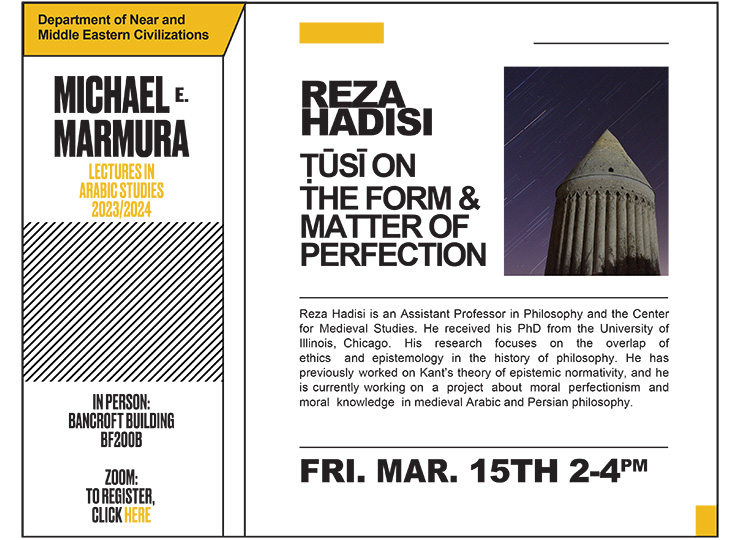
Reza Hadisi
Assistant Professor in Philosophy at the Center for Medieval Studies
Ṭūsī on the Form and Matter of Perfection
Naṣīr al-Dīn Ṭūsī (d. 1274) stands out among major figures in medieval Arabic and Persian philosophy for giving special prominence to practical philosophy and philosophical ethics in his writings. While some of this emphasis may be explained by historical contingencies in his life and events surrounding the writing of his ethical treatises, this talk explores how Ṭūsī's philosophical views on the nature of perfection contribute to this shift in attitude towards ethics as a philosophical discipline. To achieve this, I contrast Ṭūsī’s conception of absolute perfection with the Avicennian perspective. Like Avicenna, Ṭūsī is an intellectualist about absolute perfection, conceiving it in terms of intellectual perfection. However, while Avicenna sees absolute perfection primarily as perfecting the theoretical intellect, Ṭūsī argues that absolute perfection should be understood as a unity of perfected theoretical and practical intellects. In other words, for Ṭūsī, the perfection of the practical intellect is not merely instrumentally valuable in service to the theoretical intellect; rather, it constitutes an essential part of absolute intellectual perfection. To conclude, I step back and reflect on the philosophical challenges and promises of trying to make sense of human perfection in terms of godlike absolute perfection.
Reza Hadisi is an Assistant Professor in Philosophy and the Center for Medieval Studies. His research focuses on the overlap of ethics and epistemology in the history of philosophy. He has previously worked on Kant’s theory of epistemic normativity, and he is currently working on a project about moral perfectionism and moral knowledge in medieval Arabic and Persian philosophy.
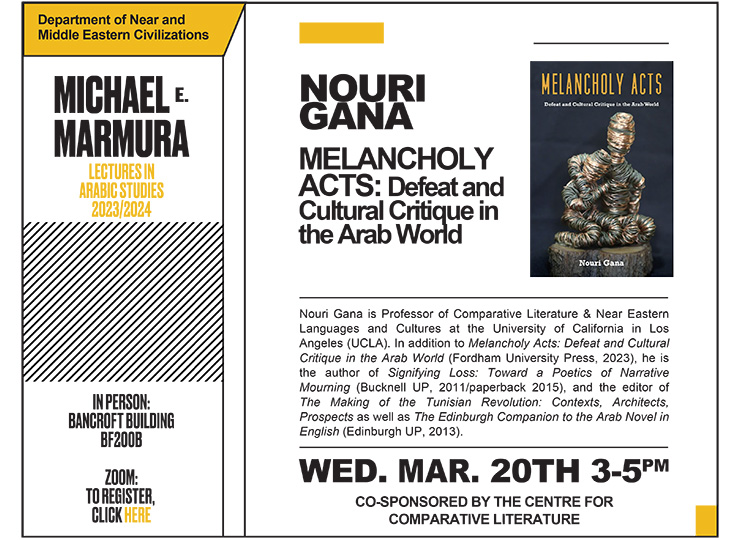
Nouri Gana
Professor of Comparative Literature & Near Eastern Languages and Cultures at the University of California in Los Angeles (UCLA)
Melancholy Acts: Defeat and Cultural Critique in the Arab World
How do the literatures and cultures of oppressed societies survive and flourish in spite of the overdetermining conditions of precarity and injustice of which they are a product and against which they protest? Might the symptom of oppression become simultaneously the agent of its critique? In Melancholy Acts, Nouri Gana addresses these questions through a series of wide-ranging engagements with Arab thought, literature, and film in the aftermath of the 1948 dispossession of Palestinians and the 1967 military defeat of Arab armies. He tracks the melancholy politics that inform the literary and cultural projects of a multitude of Arab novelists (Ghassan Kanafani and Naguib Mahfouz); poets and playwrights (Mahmoud Darwish, Nizar Qabbani, and Saadallah Wannous); filmmakers (Nouri Bouzid, Moufida Tlatli, Youssef Chahine, and Hany Abu Assad); alongside the work of Arab and non-Arab intellectuals.
Nouri Gana is Professor of Comparative Literature & Near Eastern Languages and Cultures at the University of California in Los Angeles (UCLA). In addition to Melancholy Acts: Defeat and Cultural Critique in the Arab World (Fordham University Press, 2023), he is the author of Signifying Loss: Toward a Poetics of Narrative Mourning (Bucknell UP, 2011/paperback 2015), and the editor of The Making of the Tunisian Revolution: Contexts, Architects, Prospects as well as The Edinburgh Companion to the Arab Novel in English (Edinburgh UP, 2013).
Nizar Hermes
Professor, Department of Middle Eastern and South Asian Languages, University of Virginia
Let You Be an Olive Branch!” How the (hi)story of an Andalusian Muslim poet-diplomat at a ninth-century Viking court inspired a modern Iraqi poet-diplomat
2022–2023 Lectures
Fridays 3 - 5 PM
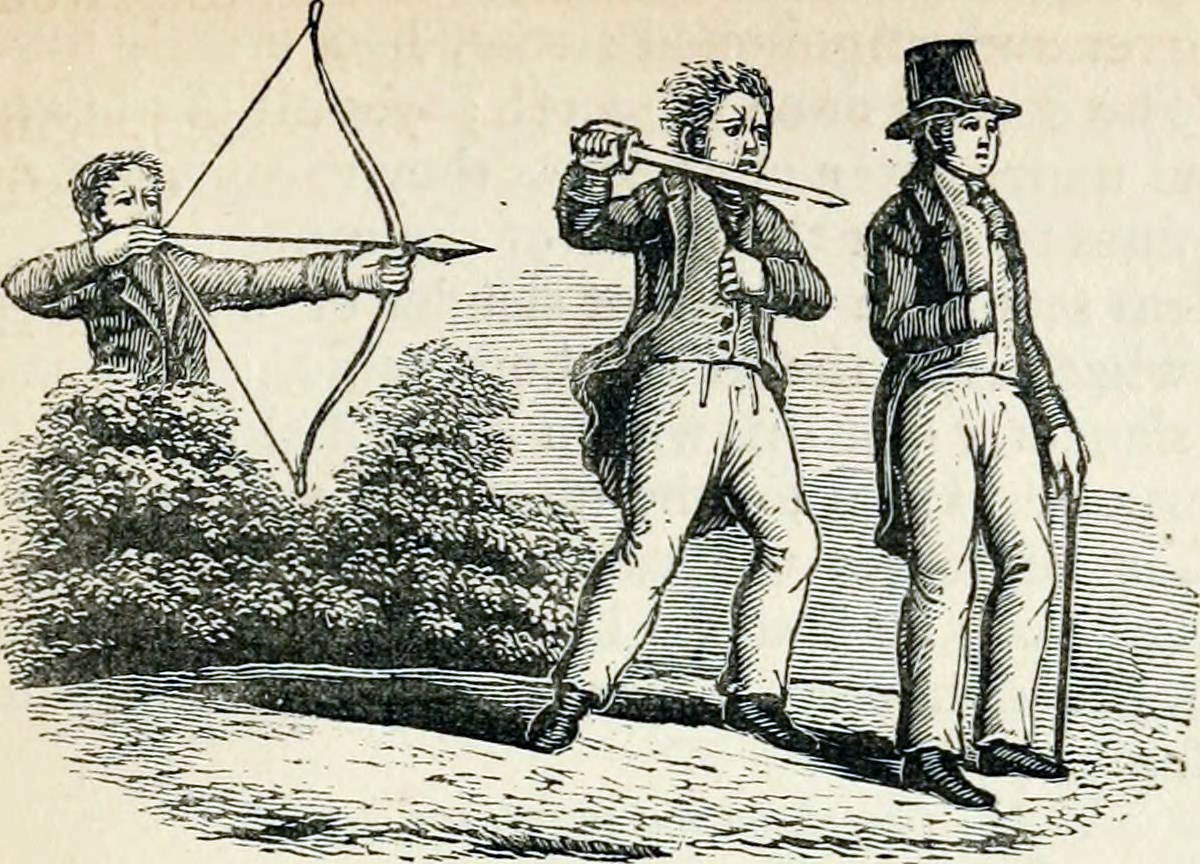
Suleyman Dost
Assistant Professor of Late Antiquity and Early Islam, University of Toronto
Flesh-Eating and Backbiting: Adventures of an Idiom from Akkadian to the Qur’an
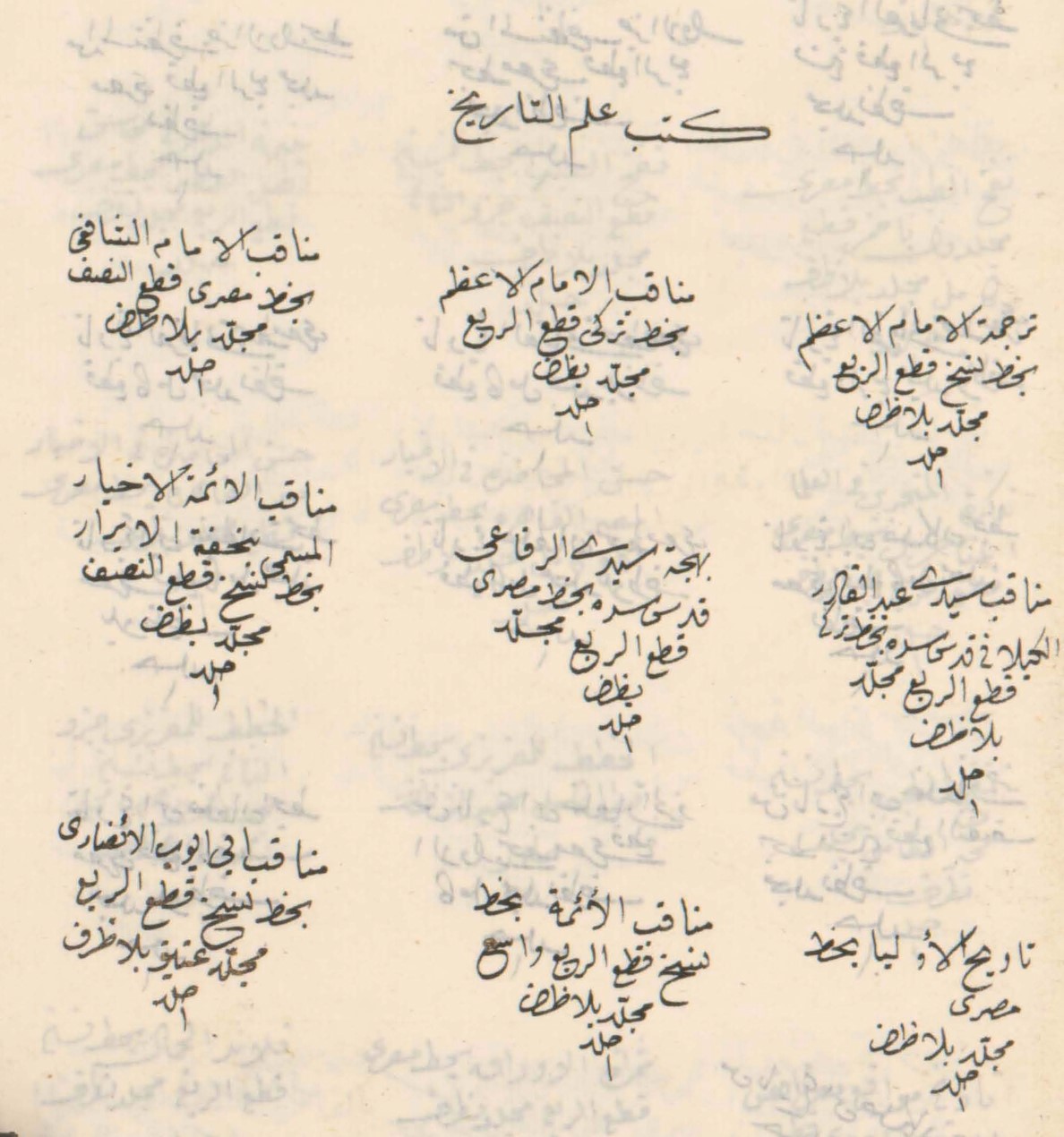 Image @ the Vakiflar Genel Mudurlugu in Ankara
Image @ the Vakiflar Genel Mudurlugu in AnkaraDana Sajdi
Associate Professor of History at Boston College
Curating Palestinian Heritage: Preliminary Thoughts on an 18th-century Library in Acre (al-Jazzar’s al-Nur Ahmadiyya Library)
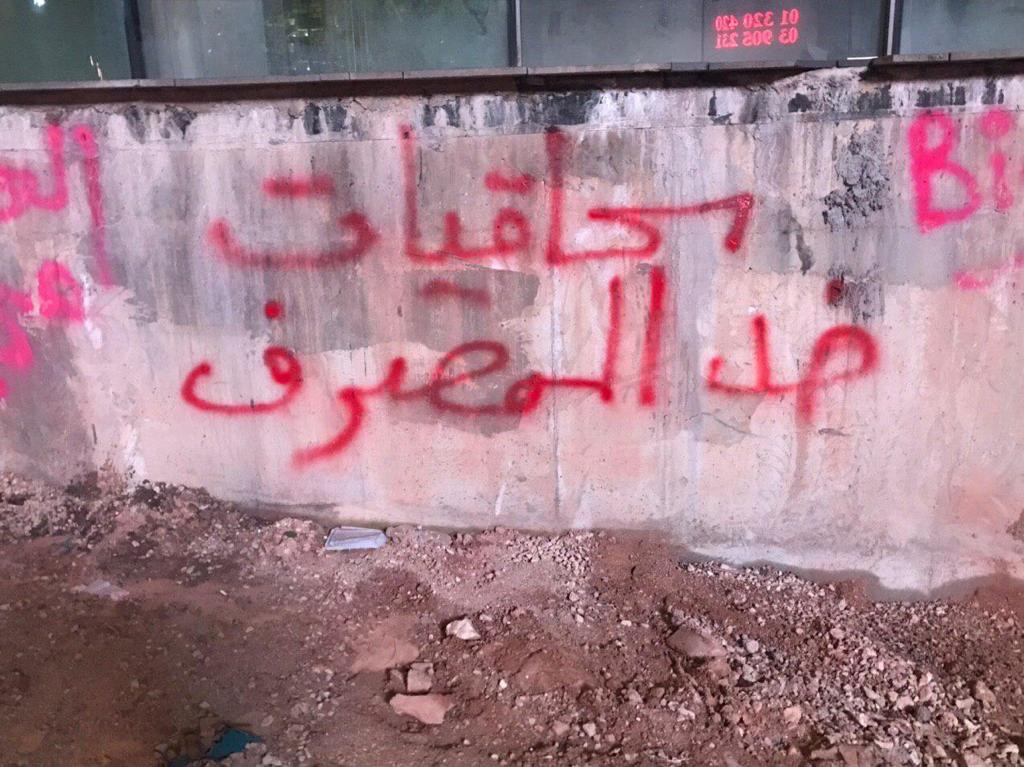 Photo Credit: Maya El Helou
Photo Credit: Maya El HelouJanine Clark & Maya El Helou
Bumps in the Map: The Infrastructure of LGBT and Queer Activist Subjectivities in the Middle East and North Africa
Janine Clark is a Professor in the Department of Political Science. Her work focuses on decentralization and local politics, Islamist movements, civil society activism and women and politics in the Middle East and North Africa. Currently, she is working on a project examining trans-regional LGBT and queer activism in the MENA.
Maya El Helou is a PhD candidate at the Department of Anthropology in a collaborative program with Women and Gender Studies at the University of Toronto. Her theoretical interest revolve around necropolitics, queer theory, embodiment, temporality, and spatiality along with urban infrastructure.
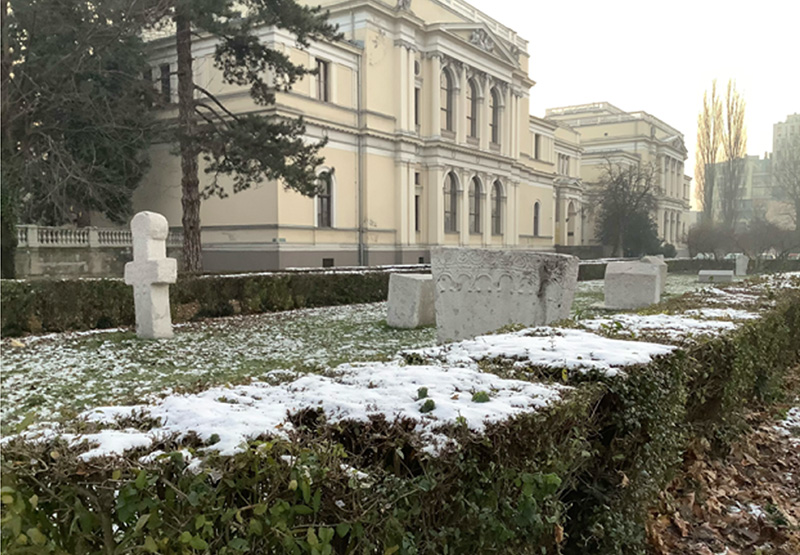 Image @ National Museum of Bosnia and Herzegovina
Image @ National Museum of Bosnia and HerzegovinaAmila Buturovic
Professor, York University
Occult Tools for Health and Protection in Ottoman Bosnia: Talismanic Charts at the National Museum in Sarajevo
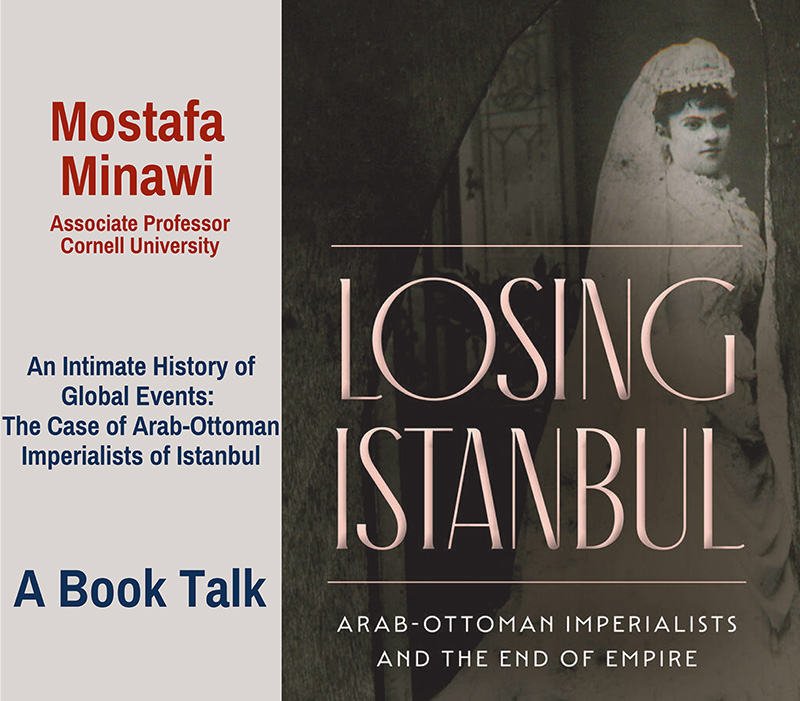
Mostafa Minawi
Associate Professor, Cornell University
A Book Talk
An Intimate History of Global Events: The Case of Arab-Ottoman Imperialists of Istanbul
This event is from 2 PM to 4 PM.
Mostafa Minawi is Associate Professor of History at Cornell University. He is the author of The Ottoman Scramble for Africa: Empire and Diplomacy in the Sahara and the Hijaz (Stanford, 2016).
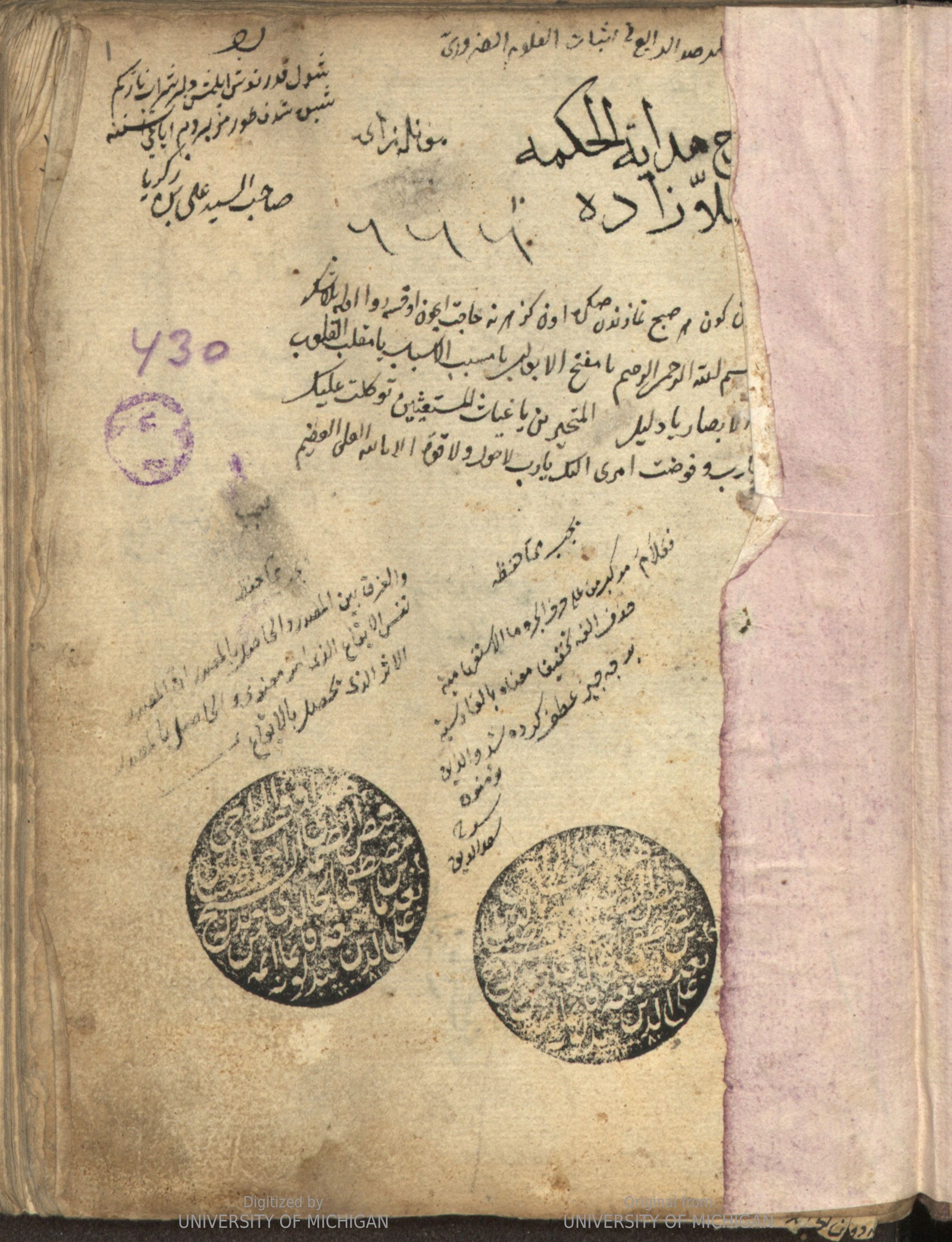
Evyn Kropf
librarian and curator of Islamic manuscripts, University of Michigan Library
Recovering Collective Memory: Tracing the Arabic, Persian, and Turkish manuscripts of Gümüşhanevî foundation libraries across dispersal and collection
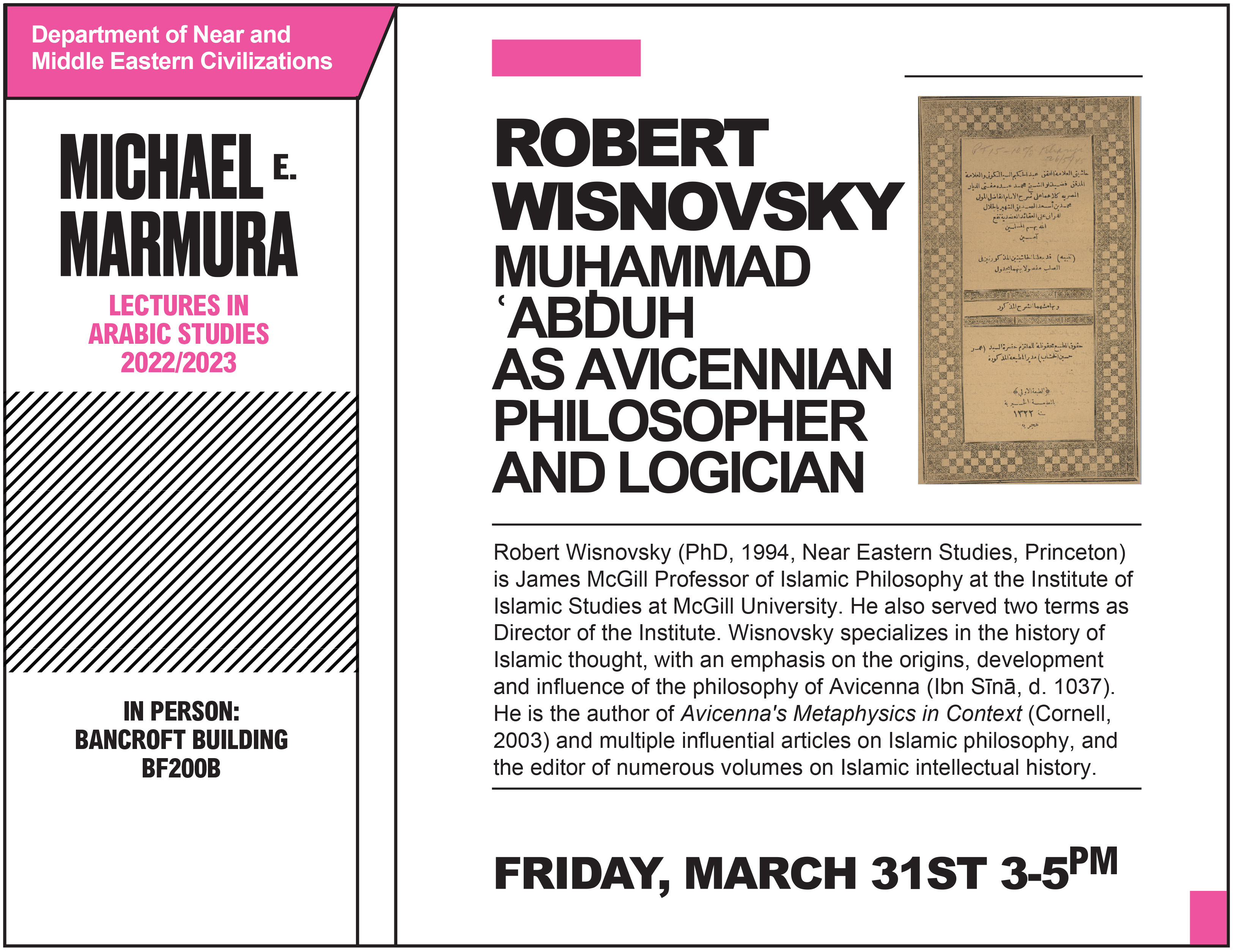
Robert Wisnovsky
James McGill Professor of Islamic Philosophy at the Institute of Islamic Studies at McGill University
Muḥammad ʿAbduh as Avicennian philosopher and logician
2021–2022 Lectures
Fridays 3 - 5 PM
(For now, we are planning on holding the series on zoom and will re-assess in early October.
In order to respect the CAUT censure, the lecture series will only feature faculty from the University of Toronto.
And given the Palestine speech exception in the Azarova affair, this year’s series will have a strong focus on Palestine.)
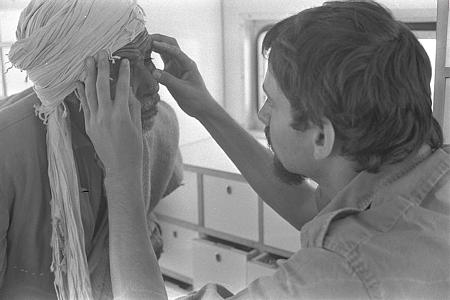 Israeli military physician examining a Sinai Bedouin man in 1972 (Israel National Photo Collection)
Israeli military physician examining a Sinai Bedouin man in 1972 (Israel National Photo Collection)Elise Burton
Institute for the History and Philosophy of Science and Technology (IHPST)
“Genetic Research and Territorial Occupation: Palestine, Sinai, and the Aden Emergency”
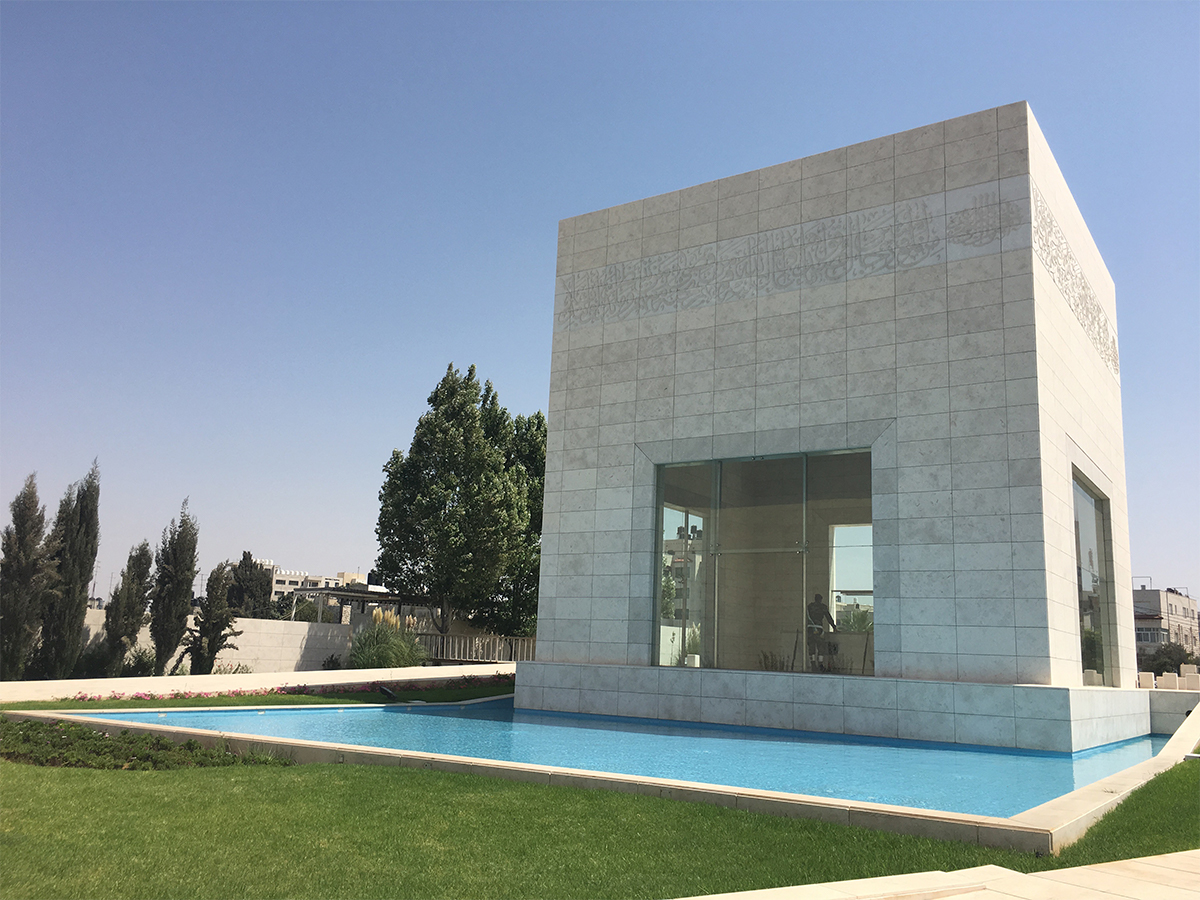 Yasser Arafat Mausoleum, Ramallah (author: 2016)
Yasser Arafat Mausoleum, Ramallah (author: 2016)Anwar Jaber
AMTD Global Talent Postdoctoral Fellow at the School of Architecture, University of Waterloo
Architectural of Statehood: Investigating Palestinian State Structures
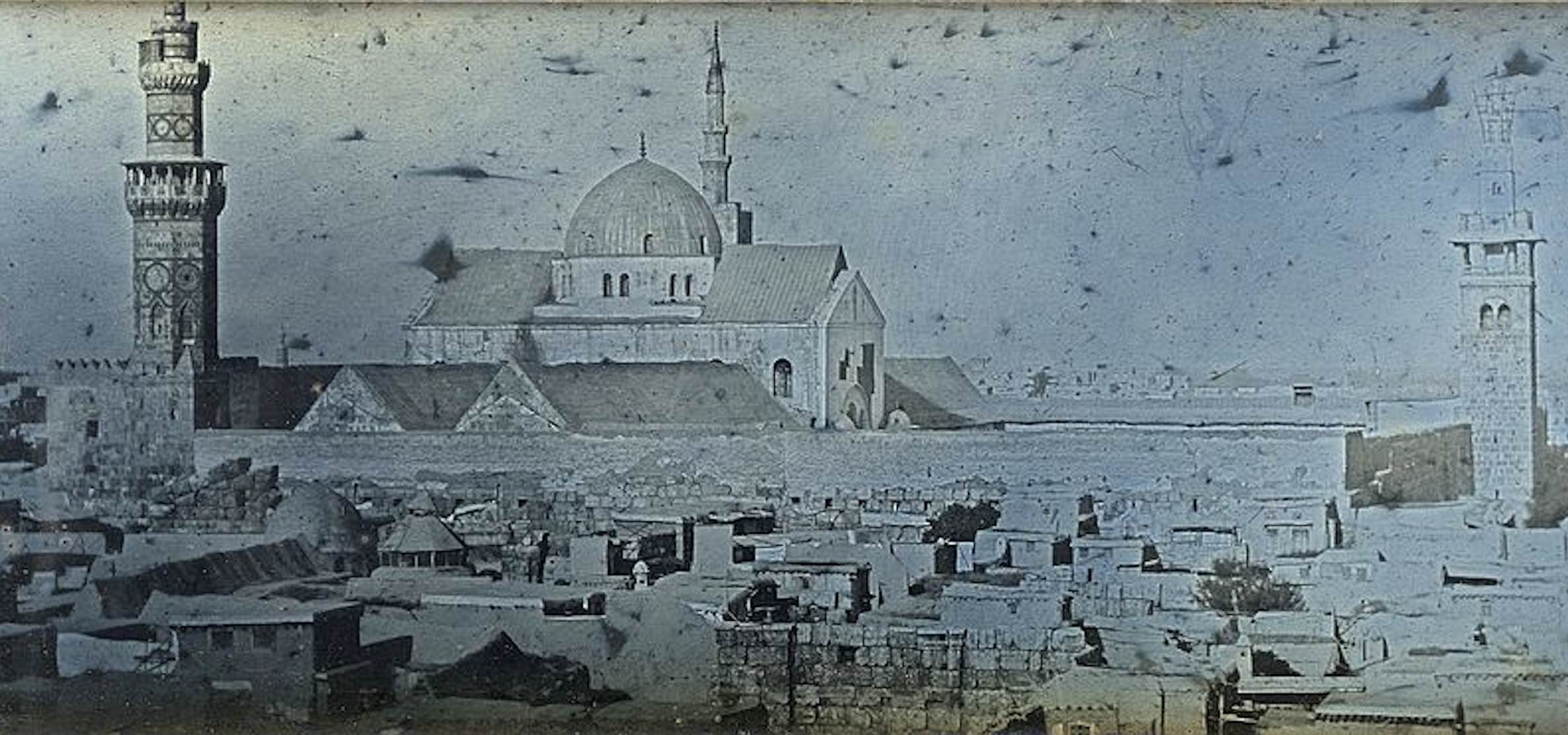 Image @ Joseph-Philibert Girault de Prangey, Public domain, via Wikimedia Commons
Image @ Joseph-Philibert Girault de Prangey, Public domain, via Wikimedia CommonsRuba Kana'an
Visual Studies, UTM; Near and Middle Eastern Civilizations, UTSG
Reading the Friday Mosque: Architecture and Nostalgia in Medieval Damascus and Cairo
Oscar Lӧsgren and Renata Traini. Arabic Manuscripts in the Biblioteca Ambrosiana. Italy: Neri Pozza, 1975. Vol. 1, Plate XIV
Michael Payne
Ludwig-Maximilians-Universität München
The Nature of a Gentleman’s Dominion:
al-Jāḥiẓ on Slavery and Human Difference
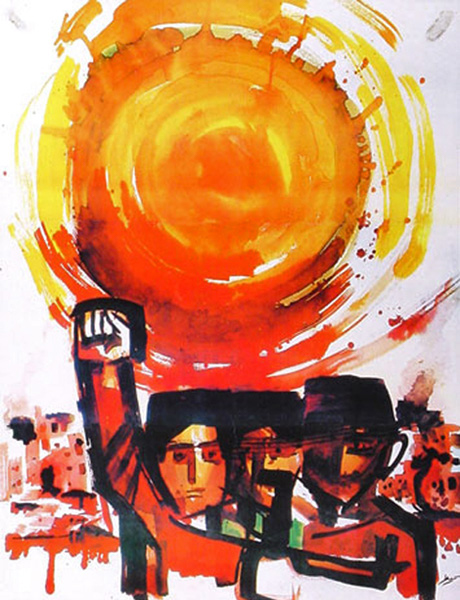
Image @Ismail Shammout
Chandni Desai
University of Toronto
Against Acts of Elimination:
Making Palestinian Resistance Culture from the Frontiers
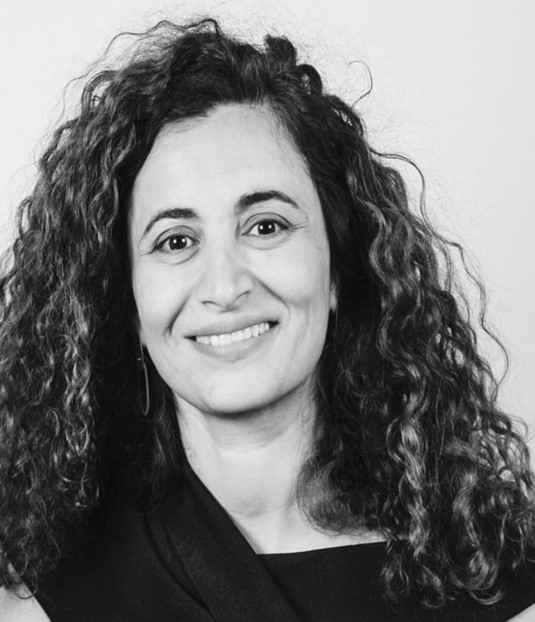
Feriel Bouhafa
University of Cambridge
Conceptions of the Good in Islamic Theology and Philosophy: The Relation Between Metaphysics and Ethics
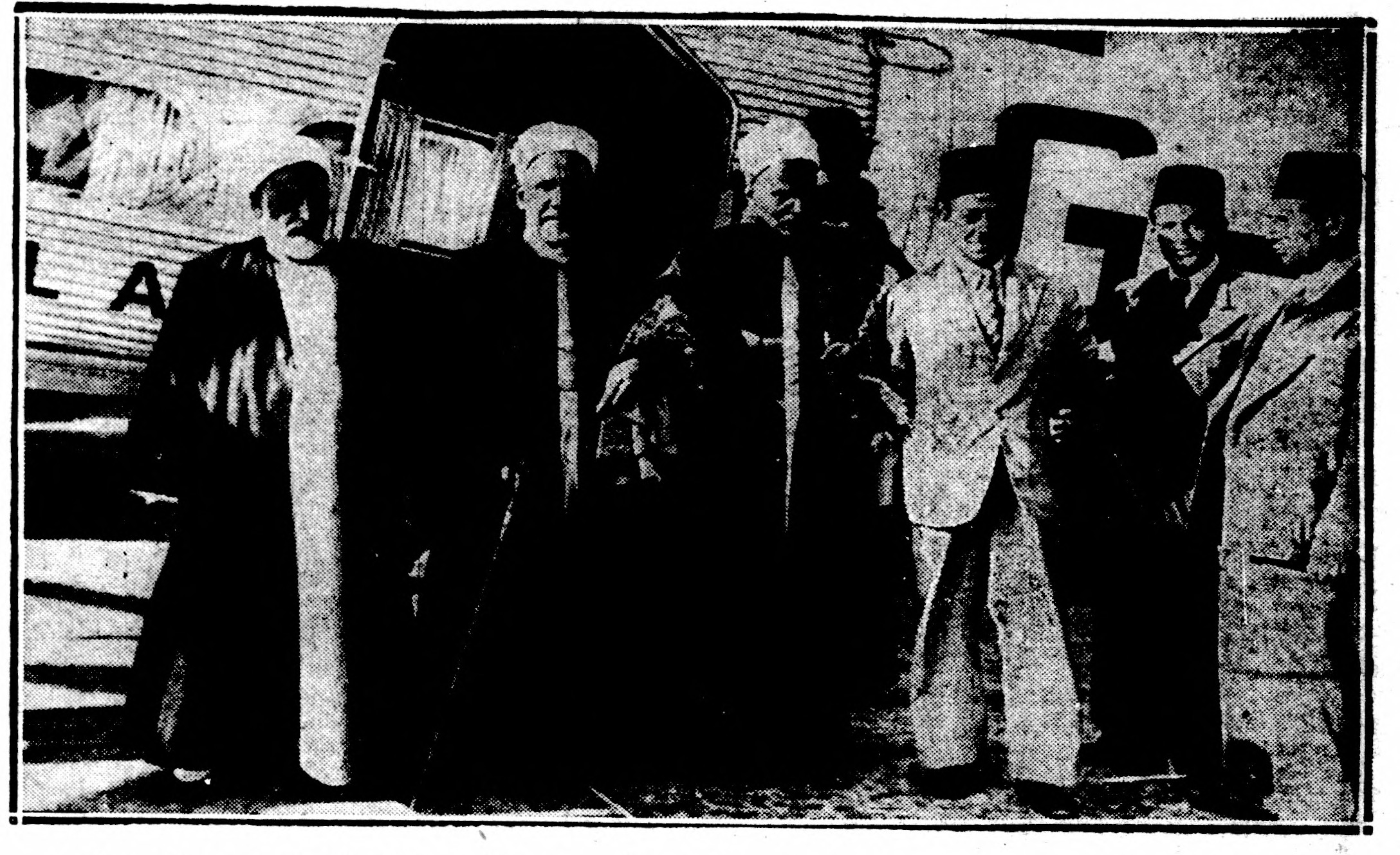
Esmat Elhalaby
University of Toronto
Race, Caste, Sect, and the Limits of Pan-Islam
2020-2021 Lectures
Fridays 3 - 5 PM
(Videos only available to the University of Toronto community)
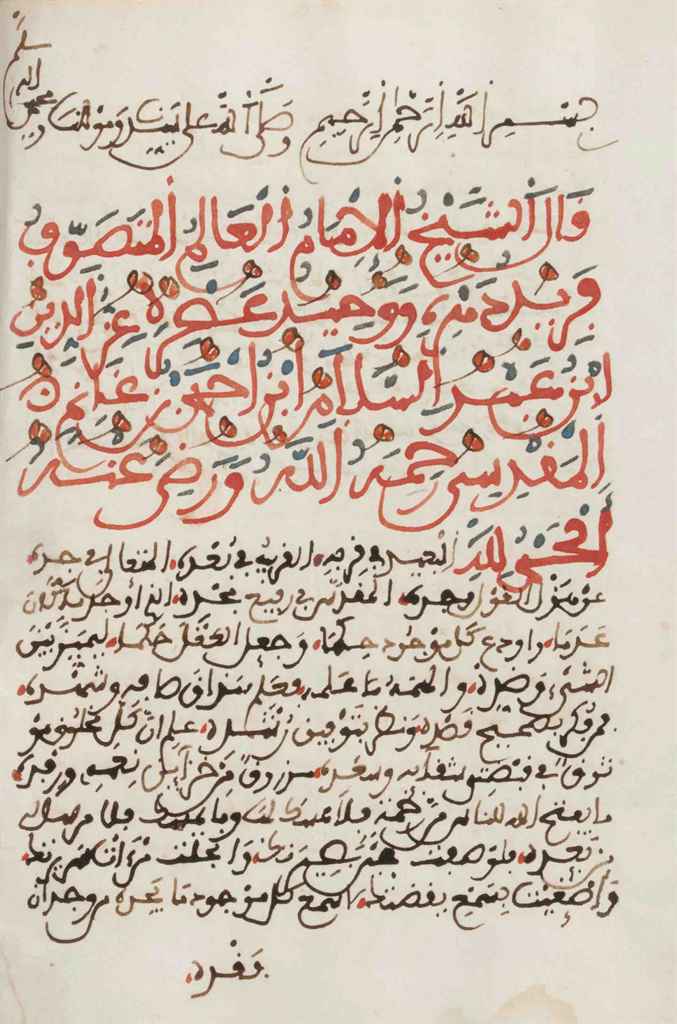
Mariam Sheibani
Visiting Assistant Professor, University of Toronto Scarborough
“Judicial Crisis in Damascus on the Eve of Baybars’ Reform: The Case of the Orphan Girl and Her Cunning Guardian (654–55/1256–57)”
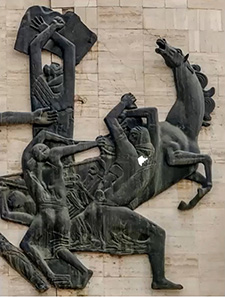
Sara Pursley
Assistant Professor, New York University
“Familiar Futures: Time, Selfhood, and Sovereignty in Iraq”
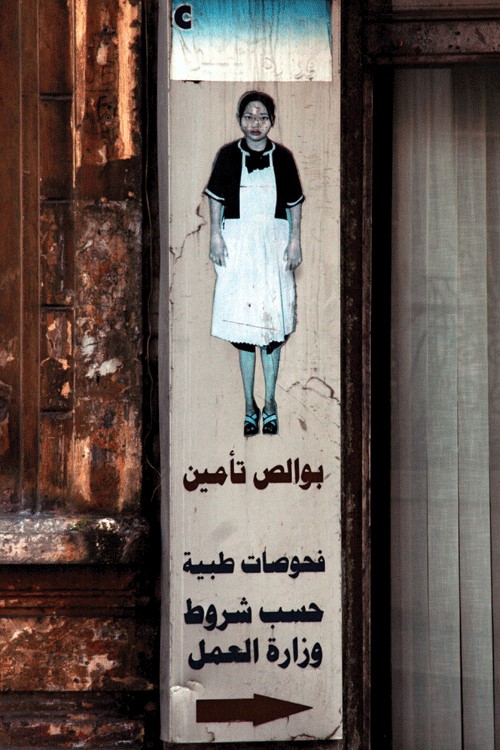
Sumayya Kassamali
Assistant Professor, University of Toronto
“What is Kafala? An Account of Migrant Labour in Lebanon”
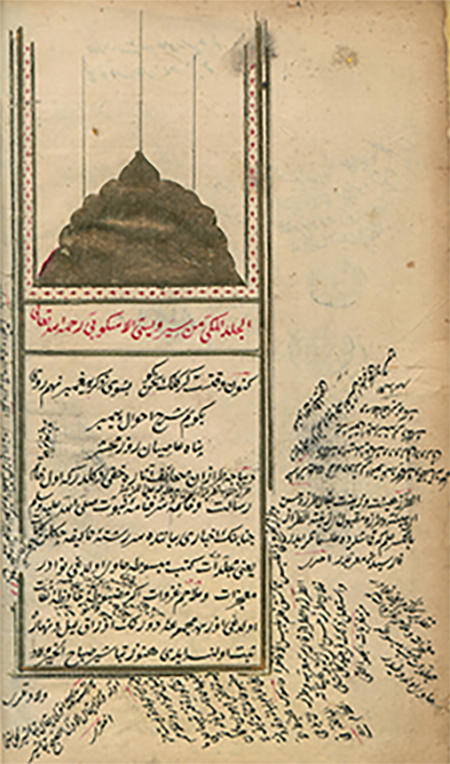
Introduction by Jens Hansen, "A Laudatio of Professor Michael E. Marmura"
Aslıhan Gürbüzel
Assistant Professor, McGill Institute of Islamic Studies
“Arabic Philology in Ottoman Istanbul: Practices of Textual Edition in a Manuscript Culture”
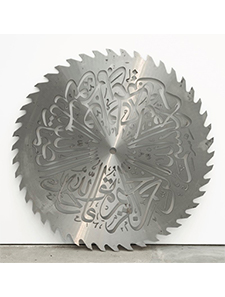
Hoda El Shakry
Assistant Professor, University of Chicago
“The Literary Qurʾan”


